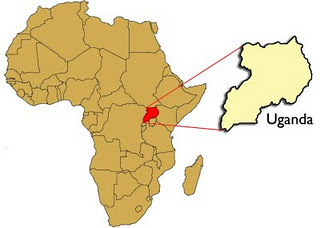Uganda is a small country located in East Africa. It borders Kenya, Democratic Republic of Congo, Sudan, Tanzania, and Rwanda. Uganda lies right across the equator, so in this little country you will find swampy lowlands, fertile wooded hills, and a desert region. It is the second most populous land-locked country in Africa with a population of about 36 million people. The official language of Uganda is English, but the most popular central language, which is spoken across the country, is Luganda (which I will be learning as a PCV!). There are a handful of other languages spoken in Uganda as well, including Swahili.
In 1962, Uganda gained independence from Britain and held their first official election in that same year. The election was won by an alliance between Uganda People's Congress and Kabaka Yekka. Later, in 1966, the UPC-controlled government changed the constitution to remove the ceremonial president and vice president. The following year, Uganda was proclaimed a republic and was rid of the traditional kingdoms.
*Peace Corps Uganda: received it's first volunteers in November of 1964 and consisted of a group of secondary school teachers. This PC education program in Uganda more than doubled it's volunteers within the first two years and then initiated a health program in 1968. Due to unfortunate civil unrest, Peace Corps terminated their program in Uganda in 1973. Just over a decade later, Uganda and Peace Corps began discussing the return of volunteers to their country. In the summer of 1991, volunteers were back in Uganda and quickly grew. Peace Corps Uganda now has multiple programs including primary and secondary education, civil engineering, community conservation, technical education, and micro-enterprise development. The program was suspended again in 1999 until 2000 because of local security issues. As of 2010, Uganda has about 122 Peace Corps volunteers serving at any given time.

No comments:
Post a Comment